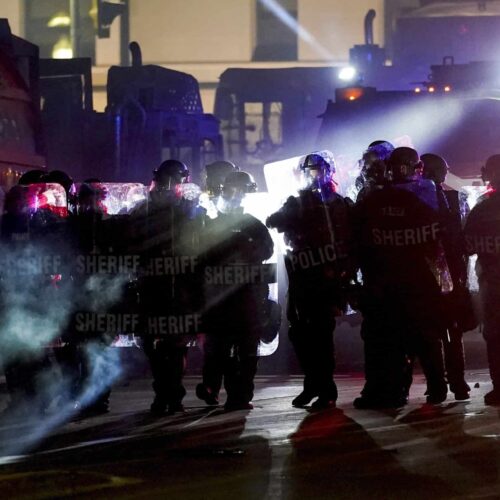Introduction
This week, senior reporter Alexia Fernández Campbell looks at controversy within the labor movement over the role of police unions, and we’re excited to bring you a sneak peek of a new Public Integrity podcast, “The Heist,” accompanied by a Freedom of Information Act contest and an upcoming discussion with economist Robert Reich.
— Matt DeRienzo, editor in chief, mderienzo@publicintegrity.org
This edition: police unions
National labor unions are resisting pressure to oust police from their ranks. Again.
After a police officer shot and paralyzed Jacob Blake in Kenosha, Wis., on Aug. 23, labor leaders were quick to denounce police brutality and racism. The AFL-CIO launched a task force to focus on policing and racial justice.
The influential labor group’s response to the shooting made no mention of controversy surrounding police unions and their role in the labor movement. Civil rights groups have called out police unions for protecting bad cops, and those cries are growing louder as more police violence is caught on video.
The white officer who shot Blake, a Black man, belongs to the Kenosha Police Professional Organization, a union unaffiliated with the AFL-CIO. Its last contract with the city included a “Bill of Rights” for officers under investigation for using excessive force — a common provision in police union contracts. The language limits when, where and how investigators can question officers when there is an allegation. It even bans investigators from using “offensive language” toward a cop under investigation.
Critics say these contracts shield police from accountability and make communities less safe.
“Labor has to make a decision about whether it is going to do something or nothing,” said David Harris, managing director of the Charles Hamilton Houston Institute for Race and Justice at Harvard Law School. “We’re beyond task forces and commissions and studies.”
Harris was one of dozens of academics, local lawmakers and civil rights activists who signed a letter in June urging the AFL-CIO to expel cops from its member unions.
The AFL-CIO did not respond to questions about the controversy.
Civil rights groups began pressuring the AFL-CIO and national labor unions to kick out law enforcement after a Minneapolis police officer killed George Floyd — another Black man — in June. Several member unions in the federation represent corrections and immigration officers through their local affiliates; the International Union of Police Associations is also a member.

So far, the AFL-CIO has rejected the idea. Richard Trumka, head of the federation, has insisted that talking to police unions will lead to change. The organization is likely hesitant to oust police officers because its unions have thousands of dues-paying members in law enforcement. The IUPA, for example, represented more than 23,000 police officers through its local affiliates in 2019, according to tax filings.
“That was expected on some level, but it’s also disappointing,” said Scott Roberts, head of criminal justice for the civil rights group Color of Change, referring to the AFL-CIO’s hesitance.
Roberts has been talking to union leaders within the AFL-CIO for weeks, asking them to pressure the organization to expel police. But so far, the Writers Guild of America, East, is the only major union that has passed a resolution urging leadership to do that.
The AFL-CIO has instead launched another racial justice task forcethat, among other things, will focus on how to improve policing. Notably missing are representatives of IUPA, the only police union in the labor federation.
The IUPA did not respond to a request to comment. Nor did other national unions that represent law enforcement officers, including the Service Employees International Union and the Communications Workers of America.
The federation has kicked out unions in the past for not aligning with its values. Starting in 1949, when the group was called the Congress of Industrial Organizations, leaders expelled 11 member unions over their alleged ties to the Communist Party. The AFL-CIO booted another two affiliates in 1957 over corruption allegations.
Roberts, from Color of Change, said the fight over police unions will continue.
“The AFL-CIO is a federation of unions; it will take a lot to move an institution that big and with that many stakeholders,” he said. “Our strategy is to move the member unions one by one.”
(Editor’s note: The author of this article is a member of the Washington-Baltimore News Guild, which is affiliated with the Communications Workers of America, a member union of the AFL-CIO.)
Latest from Public Integrity
Running an election in a pandemic, in 10 steps
From hiring unemployed bartenders to overcome a poll worker shortage to hitting the dollar store for supplies to protect voters from COVID-19, local election officials across the country are finding creative ways to run elections safely and efficiently this year. From Carrie Levine and Matt Vasilogambros.
We want to know about changes to your polling place
Public Integrity is teaming up with the Pew Charitable Trusts’ Statelineproject to present “Barriers to the Ballot Box,” coverage of crucial voting access issues this fall. If you’ve had issues with your local polling place location changing or closing, we’d love to hear more.
From the ’60s to 2020, fighting for the right to vote.
Attempts to prevent Black people from voting in this November’s election are just a modern version of Jim Crow-era tactics that were reined in by the now-weakened Voting Rights Act of 1965, a panel of experts said in an online forum held Wednesday by Public Integrity and the Student Nonviolent Coordinating Committee Legacy Project. From Matt DeRienzo.

Coming next week: ‘The Heist:’ A Public Integrity podcast
When Congress passed and President Trump signed a landmark tax bill in 2017, they promised it would lead to more jobs and higher wages for the middle class. It ended up being a thinly veiled transfer of billions of dollars from working Americans to a small number of big companies and billionaires. This five-episode series documents how power has worked in the Trump administration, with reporters spending months behind the scenes to introduce you to a big Republican donor, a senator caving in to political pressure, and the enigmatic Secretary of Treasury Stephen Mnuchin. Check out a preview of the first episode of “The Heist,” first episode launching on Sept 17. We’re also sponsoring a Freedom of Information Act contestwith MuckRock and a discussion with political economist Robert Reich, sociologist and Guggenheim fellow Monica Prasad and historian Molly Mitchelmore, moderated by Sally Herships, executive producer of “The Heist.” Register here.
Others on inequality
- Trump cancels race-related training, targets 1619 Project.President Trump is prohibiting federal agencies from spending money on racial sensitivity training, targeting any program that refers to the term “white privilege.” He’s also threatening to cut funding for schools that teach Nikole Hannah-Jones’ “1619 Project.” From the Washington Post and CNN.
- Hardest hit by COVID-19, Black nursing homes try to recover. Nursing homes with larger percentages of Black residents suffered higher rates of death from COVID-19 this year, laying bare a variety of underlying inequalities. From the Washington Post.
- Racist beliefs about Black culture pervasive in poverty studies. Research on poverty, published by academics across universities, think tanks, advocacy organizations, and governments, is facing a reckoning over its persistent attribution to “cultural” vs. structural issues. From The Nation.
- The racialized harm of the municipal bond market. Glaring examples of racial physical violence in cities “are often underwritten by more abstract forms of financial violence,” according to an academic study that looked at municipal bonds in Detroit. From Journalist’s Resource.
The right to know
What happens when the government hides COVID-19 information
Public Integrity has been working for months to provide the public with access to detailed information from the White House about the scope of the COVID-19 outbreak and recommendations for containing it, reports that the Trump administration has been sending to governors but is keeping secret from the public, including local public health officials. “As the virus cycles across the country in fits and starts, federal and state governments are stonewalling the release of potentially life-saving data to the public from the White House Coronavirus Task Force. As a result, in some states people are still debating whether we should wear a mask to Walmart, Safeway and Walgreens as the COVID-19 death toll marches toward 190,000,” writes Public Integrity CEO Susan Smith Richardson in an op-ed calling for more transparency.
Read more in Inside Public Integrity
Watchdog newsletter
Words matter: Was the attack on the Capitol a rally, protest or insurrection?
The question remains how history will record the events that resulted in mayhem at the U.S. Capitol.


Join the conversation
Show Comments